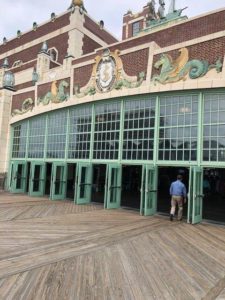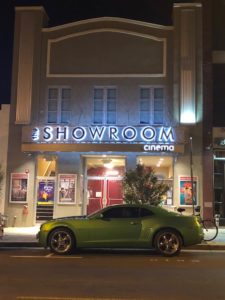
The boardwalk in Asbury Park, N.J.
I’ve always wanted to go to Asbury Park.
So last week we made the trip.
We loved it.
As we toured Belmar, Ocean Grove, Asbury, Allenhurst, Freehold, Neptune and Colts Neck one thought was top of mind: New Jersey might have the world’s worst PR, because the reality far, far, far outstrips the perception.
New Jersey is breathtakingly beautiful (that’s right) with a magnificent coast, incredible neighborhoods, vibrant cities and architecture that makes you pull over and stare.
Asbury Park has always held a place in my heart and imagination thanks to its association with my musical heroes Bruce Springsteen and The E Street Band.
I’ve read a few books about the boom and bust history of Asbury Park and the musicians who helped to put the place on the map.
So I was curious to explore the tiny (1.5 square miles) city.
Asbury has a pretty boardwalk, a beautiful beach, some amazing seaside bars, wonderful architecture, a hip hotel, a really nice downtown and some terrific restaurants.
But what sets it apart is its vibe.
Asbury Park is a town that seems to be built on rock n’ roll.
From rock photographer Danny Clinch’s “Transparent Gallery” and the Sound Booth lounge at the Asbury Hotel to the live music at Asbury Lanes and the renowned Wonder Bar—music is everywhere.
This weekend, Asbury expects 20,000 people for the first Sea. Hear. Now. music festival with big names like Social Distortion and Brandi Carlile coming to town to rock the shore.
Asbury is a town building on its roots—its glory days as evidenced by the Paramount Theatre and a grand boardwalk and a musical heritage which includes Springsteen, Southside Johnny and so many great bar bands.
Off the boardwalk, we found a nice downtown, especially Cookman Avenue which featured some interesting retail (a bookstore!, an adorable cinema and a tea house featuring cats—yes cats—called Catsbury Park) and some amazing restaurants. (If you visit, run don’t walk to Taka, it’s as good as it gets).

The surrounding towns feature block after block of really beautiful homes, Victorian gems that make you realize that Florida missed a golden opportunity by allowing so much cookie cutter housing to be built.
When visiting a place it’s important to consider its history and to see what’s in front of you. But it’s also important to understand its psychology, what drives a place. It’s critical to understand not only the reality but what the aspirations of a place are.
You can do this by observing who’s in town—what kinds of people do you see buying homes, opening businesses and investing in a place.
You can supplement what you see with a little reading—local newspapers, real estate publications, even what the hotels are saying about the town in their marketing materials.
And that’s where Asbury gets really interesting.
This little city with a rich history and a very cool present has aspirations.
Asbury is an ambitious place with a goal of becoming a nationally renowned cultural mecca built around music, art, festivals, great restaurants and a sense of place. Sound familiar?
The local press celebrates this ambition with profiles of entrepreneurs building web businesses, opening bakeries, planning music festivals, opening unique restaurants and creating boutique accommodations that pay homage to the area’s history and vibe.
One of the urban pioneers that seems to loom large is famed rock photographer Danny Clinch who has a very cool gallery attached to the ultra-hip Asbury Hotel. Clinch is arguably the most acclaimed music photographer around these days. He has chosen Asbury Park to not only show off his incredible portfolio but also to grow the city’s cultural brand.
The Sea. Hear. Now. festival is probably the most ambitious attempt so far. But the gallery itself is more than just a gallery. It’s a live music space where the local creative community can meet, grow and find encouragement and an outlet.
In many ways, I saw some parallels between Asbury Park and Delray Beach circa 1980s through early 2000s.
The emphasis on culture, food, beverage, festivals, tourism, entrepreneurship. The aspiration and hunger to fix and invest in neighborhoods and commercial districts. The willingness to take some risks. The presence of visionary pioneers with dreams and ambitions. The passion to make something happen.
I can’t comment on the politics of Asbury. But the truth is you need both the private sector and the public sector rowing in the same direction to make change and realize ambitions. It doesn’t work if volunteers, business owners and residents are out of step with local government or vice versa.
Towns need their Danny Clinch’s for sure. But they also need their elected officials and city government’s help too.





